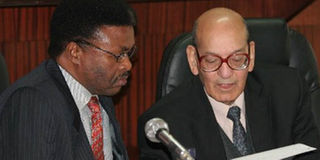Kimunya didn’t give Kenyans the full picture: report

Justice (Rtd) Majid Cockar (right) and commissioner Charles Kirui during one of the hearings. The commissions report says Kimunya was fully briefed about what the Central Bank of Kenya (CBK) was doing to sell the grand Regency hotel. Photo/FILE
Barely two days after President Kibaki re-appointed former Finance minister Amos Kimunya to Cabinet, the ghost of the controversial sale of the Grand regency hotel has returned to haunt him.
The Cockar-led Commission of Inquiry into the sale of the hotel to a Libyan firm recommended that Mr Kimunya take responsibility for the questionable disposal.
According to the Commission’s report, which was leaked to the media on Saturday, though Mr Kimunya was not directly involved in the sale of the hotel, he was fully briefed about what the Central Bank of Kenya (CBK) was doing to sell it.
The report says Mr Kimunya was briefed both orally and in writing by the Governor of Central Bank Prof Njuguna Ndung’u on the developments surrounding the sale of the hotel.
The former Finance minister, it further revealed, also failed to give Parliament and the people of Kenya the true picture on the impending sale to the Libyan Arab Investments Company (Laico).
In April last year, Mr Kimunya told Parliament that the hotel had not been sold.
The Kipipiri MP, according to the report, told the House that the government had a keen interest in the sale and that he would consult and guide the Central Bank of Kenya in the process to ensure that it was conducted in the most expeditious and cost-effective manner.
He also assured Kenyans that the value of the hotel will not be less that the highest open market value obtained during its valuation.
But two months later, Lands minister James Orengo told a news conference that the hotel had been sold to the Libyan company for Sh1.8 billion, far less than its actual value.
The report read in part, “Evidence before the commission shows that prior to the date when this issue was discussed in Parliament, a lot had taken place towards the sale of the hotel to Laico.”
The commission found that by the time Mr Kimunya was making the statement in Parliament, CBK had been negotiating for the sale of the hotel to Laico from September 2007 over a period of close to seven months.
The commission indicates in the report that CBK had agreed in writing in March 2008 to sell the hotel to Laico for $45 million and that the Libyan company had agreed to the offer.
“As at April 29, 2008, CBK was not only in the process of selling the hotel, but was firmly in the course of selling it to no one else but Laico, with whom it signed a sale agreement a week later on May 5, 2008,” says the report.
“Mr Kimunya therefore was economical with the truth... he did not disclose all the critical material facts about the sale of this hotel to Parliament and the people of Kenya,” it added.
On July 8, 2008, Mr Kimunya resigned from Cabinet to pave way for an independent commission to investigate the sale after intense public pressure.




